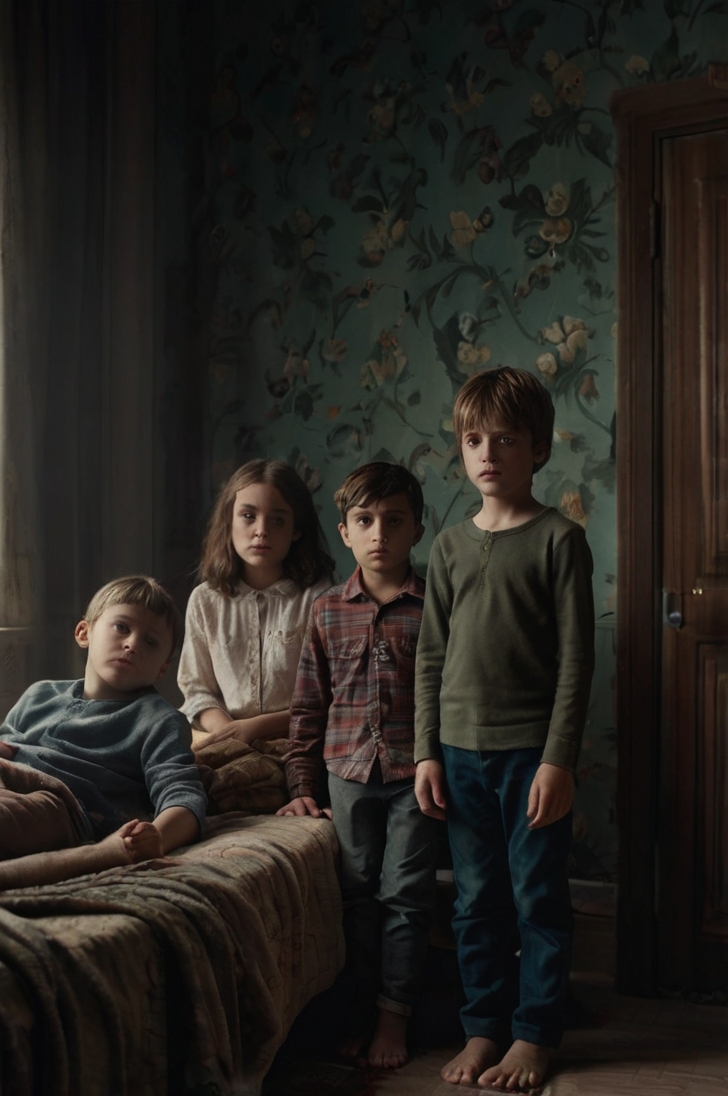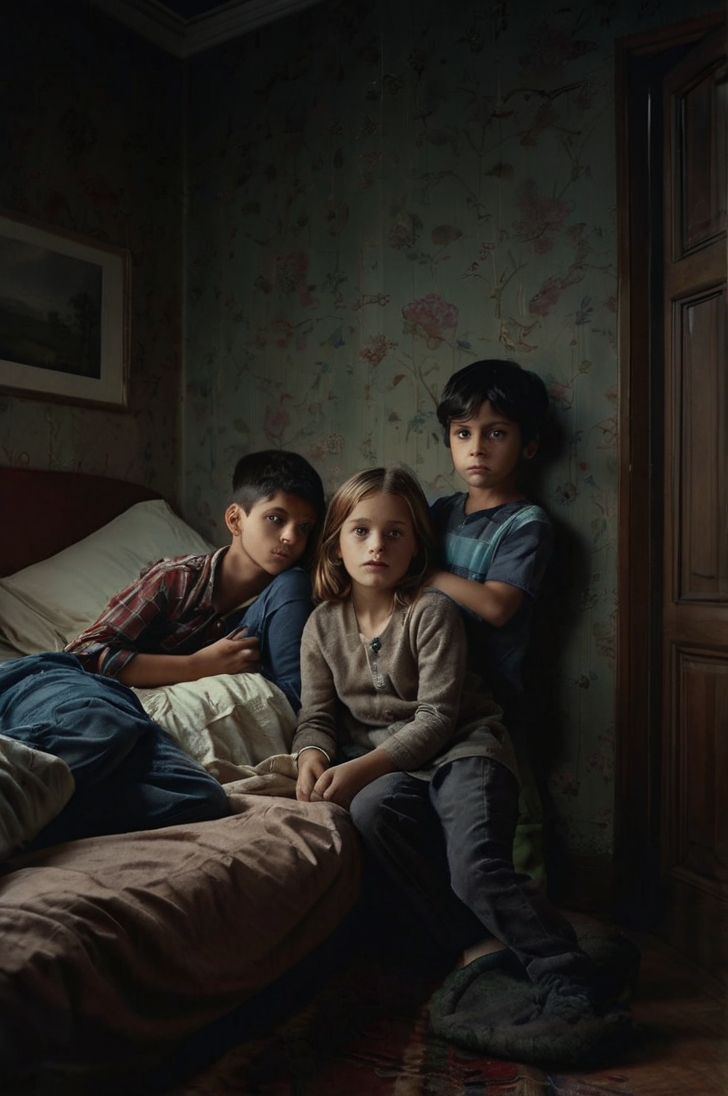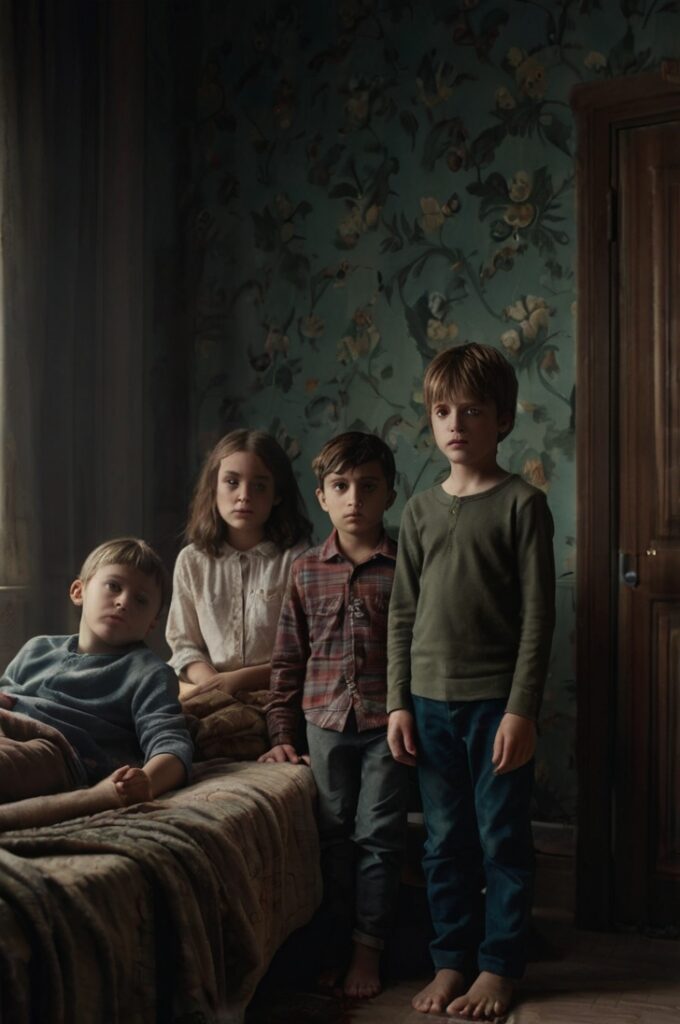My name is Nia, and I hate my mother. I hate her for putting us through so much pain and suffering.
My mother, Aisha, was my father’s mistress, one of those young women who engaged in such arrangements purely for money. But she started dating him, and then she became pregnant.
He told her to have an abortion, but she refused, threatening to make their affair public. My father, Chief Akin, a very rich and influential man who couldn’t afford such a scandal, begrudgingly accepted the pregnancy and paid her a significant dowry. It was a sordid tale, whispered about in hushed tones, a dark chapter in our family’s history, often referenced in distorted versions in local folk tales.
She moved into his sprawling mansion, but instead of allowing her into the main house, he ordered her to stay in the boys’ quarters—the staff living area—with the empty promise that he was building her a house elsewhere. Somehow, she believed him again, or perhaps clung to the illusion, and had my two younger brothers, twins, a few years later.
My father despised her so much that he transferred that hatred to us, his “illegitimate” children. He wouldn’t allow us to call him “Dad”; he ordered us to call him “Chief” so that no one outside the inner circle would know he was our father. He treated us with such cruelty, such cold indifference, that at one point I doubted he was truly our biological father. We lived in those cramped boys’ quarters for what felt like an eternity, our existence a dirty secret in the grand Akin household.
A Life of Scraps and Secrets
Our childhood was a tapestry woven with deprivation and humiliation. While Chief Akin’s legitimate children from his first wife lived lives of extravagant luxury in the main mansion—attending elite private schools, wearing designer clothes, and taking lavish holidays abroad—we survived on scraps. We ate the leftovers from the staff kitchen, wore hand-me-downs, and attended the local public school, where our very existence was a constant source of whispered gossip.

My mother, Aisha, despite the dowry, seemed content with this arrangement, or perhaps too broken to fight. She clung to the meager allowances Chief Akin gave her, convinced that one day he would fulfill his promise, that he would acknowledge us. She lived in a delusional haze, constantly telling us, “Just be patient. Your father loves us in his own way.” Her blind faith infuriated me.
I, however, never believed her. I watched Chief Akin’s cold eyes, his dismissive gestures. I saw the disdain in his legitimate children’s faces when they encountered us by chance. I learned early that love wasn’t a given; it was a battle. And we were losing.
The only solace was my younger brothers, Kola and Tayo. They were inseparable, their twin bond a fortress against the harsh realities of our lives. I vowed to protect them, to give them a life beyond the confines of the boys’ quarters.
A Desperate Escape and a Hidden Truth
As soon as I finished secondary school, I knew I had to escape. I worked odd jobs, saved every penny, and secretly applied for scholarships. My goal was to leave Lagos, to leave Nigeria, to leave behind the suffocating legacy of Chief Akin. I secured a small scholarship to a university in Canada, enough to cover tuition, but little else.
My mother begged me not to go. “Who will take care of us?” she wailed, clinging to my arm. But I was unmoved. “You chose this life, Mama,” I retorted, “I won’t let it be ours.”
I left. I broke contact with Chief Akin entirely. I sent what little money I could to my brothers, urging them to study, to find their own escape. I never called my mother. My hatred was a bitter fuel that drove me forward.
Years passed. I worked tirelessly, completed my degree, and built a successful career in renewable energy. I deliberately chose a field far removed from my father’s oil empire. I returned to Nigeria only once, briefly, for a conference, but never visited the mansion. I heard snippets of news: Chief Akin’s empire was thriving, his legitimate children now powerful figures. My brothers had also found success, one a doctor, the other a respected lawyer—a quiet victory I took immense pride in.
Then, a decade after I left, a cryptic email arrived. It was from a law firm, announcing the sudden death of Chief Akin. It stated that all his children, including his “unacknowledged” offspring, were required to attend the reading of his will. A single, ominous line followed: “Special provisions have been made for all parties.”
I flew back, my heart a mixture of grim satisfaction and cold dread. The mansion, still opulent, felt like a tomb. My estranged siblings from the main house greeted me with thinly veiled hostility. My brothers, Kola and Tayo, looked older, wiser, their eyes holding a shared history of unspoken pain. My mother, Aisha, was there too, surprisingly frail, her once-vibrant eyes now shadowed with age and a fragile hope.
The Unveiling and the True Inheritance
The lawyer, a stoic man with knowing eyes, began to read the will. It was a spectacle of power and privilege. Vast sums of money, properties, and companies were bequeathed to his legitimate children. My siblings sneered, believing we would get a pittance.

Then, the lawyer paused. His gaze swept over us, finally resting on my mother and me.
“And now,” he announced, “for Chief Akin’s unacknowledged children: Nia, Kola, and Tayo. Chief Akin had a very particular final request.”
My siblings scoffed. My mother leaned forward, a desperate hope in her eyes.
“Chief Akin,” the lawyer continued, “bequeaths to you, Nia, Kola, and Tayo, not just a share of his financial wealth, but something far more significant. He leaves you primary ownership of ‘Phoenix Holdings’—a clandestine global investment firm he established twenty years ago, built entirely from his earliest, most lucrative ventures, before his public oil empire took shape.”
My jaw dropped. Phoenix Holdings? That was the shadow company rumored to control vast, untraceable assets, a phantom enterprise whispered about in the highest echelons of global finance. It was worth billions.
“Furthermore,” the lawyer stated, his voice resonating through the shocked silence, “Chief Akin established this firm with the express purpose of providing a hidden, independent legacy for his children who he believed possessed true resilience and grit. He instructed me to reveal its existence only upon his death, and only to those children who, despite his apparent cruelty, managed to build a life for themselves outside his direct influence. He called it ‘The True Legacy.'”
My siblings erupted in outrage, demanding explanations.
“And finally,” the lawyer interjected, raising a hand for silence, “Chief Akin left one last, crucial document. A sealed letter, to be read only by Aisha, Nia, Kola, and Tayo.”
He handed a thick, yellowed envelope to my mother. She opened it with trembling fingers, her eyes scanning the familiar handwriting. As she read, her face crumpled, not in sorrow, but in a mixture of profound shock and a dawning, terrible realization.
“Mama, what is it?” I whispered, my heart pounding.
She looked at me, her eyes filled with a grief far deeper than Chief Akin’s death. “Nia… this letter… it’s not from your father. It’s from my father. My true father.”
A collective gasp filled the room.
“Chief Akin… he wasn’t your biological father. He couldn’t have children,” Aisha whispered, her voice barely audible. “He was infertile. That was his great secret, his great shame. The ‘dowry’ he paid… it was for me to be a surrogate. To carry his lineage, conceived through a discreet, undisclosed donor, so he could maintain his image, his power.”
“But… but you told me he forced you,” I stammered, my world tilting on its axis.
“He did force me,” she cried, tears streaming down her face. “He threatened my family, my village, my life, if I didn’t agree. He selected the donor himself, a brilliant but impoverished medical student he believed shared his lineage traits. He used me. And then he hated me because I was a constant reminder of his secret failure, his inability to father children naturally. The cruelty, the boys’ quarters… it was all to keep up the charade, to punish me for his own impotence.”
“And your true father?” Kola asked, his voice shaking.
“My true father,” Aisha choked out, holding up the letter, “was Dr. Kenji Okoro. The medical student. He was the donor. He was a kind, brilliant man. He contacted me once, years ago, after he had become a renowned geneticist, to secretly offer us support, to acknowledge you children. But… Chief Akin found out. He threatened to ruin Dr. Okoro’s career, to expose everything. So Dr. Okoro created Phoenix Holdings in secret, pouring his own vast earnings into it, establishing it with Chief Akin to look like Akin’s brainchild, but truly as a hidden legacy for his own children – you three. He knew Akin would never claim you publicly, but that he would respect the terms of the inheritance to avoid scandal, thus delivering the true legacy to you at his death.”
The ultimate twist. The man we hated, our “father,” was merely a cruel caretaker of a legacy intended for us by a biological father we never knew, a man who loved us enough to fight for our future in secret. Our mother, too, was a victim, trapped by fear and circumstance, not just a willing participant in a selfish scheme.
A Legacy Reclaimed, A Future Forged
My siblings from the main house were left with Chief Akin’s crumbling, public empire, tarnished by scandal. We, the “unacknowledged” ones, inherited the true wealth, the secret empire built on brilliance and a profound, silent love.
I looked at my mother, no longer with hatred, but with a dawning understanding and immense pity. She had been a prisoner, just as we were, bound by Chief Akin’s malice and her own deep-seated fears.
We forgave her. Not instantly, not easily, but slowly, painfully. We moved her from the boys’ quarters to a beautiful home, not as Chief Akin’s mistress, but as our mother.
Kola, Tayo, and I took control of Phoenix Holdings. We restructured it, pouring its resources into ethical investments, into groundbreaking research, into genuine philanthropy, honoring the true legacy of Dr. Kenji Okoro—the father who truly saw us, even from the shadows.
Our old mansion was eventually sold, its dark secrets dispersed. The boys’ quarters were torn down. The story, once a tale of shame, was rewritten.
Sometimes, the greatest inheritance isn’t just money. It’s the hidden truth that sets you free, allowing you to build a future not from hatred, but from a legacy of unseen love. And sometimes, the very people you despise are victims themselves, entangled in a web of secrets far deeper than you could ever imagine.
What hidden truths might shape your own legacy?
Beta feature


